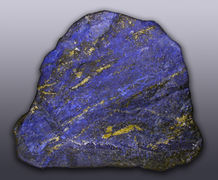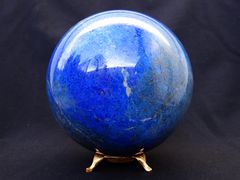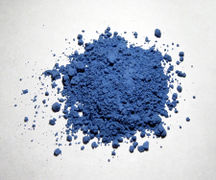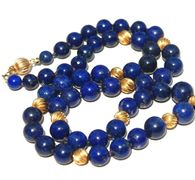Lapis lazuli: Difference between revisions
No edit summary |
(Added image) |
||
| Line 23: | Line 23: | ||
File:2 lapis lazuli.jpg|Polished sphere of lapis | File:2 lapis lazuli.jpg|Polished sphere of lapis | ||
File:Natural ultramarine pigment.jpg|Natural ultramarine pigment made from ground lapis lazuli | File:Natural ultramarine pigment.jpg|Natural ultramarine pigment made from ground lapis lazuli | ||
File:lapis necklace.jpg|Lapis and gold necklace | |||
</gallery> | </gallery> | ||
Revision as of 04:19, 26 December 2016
Lapis lazuli is one of the gems most used by El Morya. El Morya’s flame comes through this gemstone, and it is the sign and symbol of the Order of the Good Samaritan. It is a very happy, healing, joyous, energy-giving stone to wear.
The finest and most wonderful lapis comes from Afghanistan. It is a beautiful, blue, ornamental material which is composed of the blue minerals hauynite and sodalite. Small crystals of pyrite give it the gold specks which make it more highly prized.
According to most authorities, what was called sapphir or sapphire in ancient or Old-Testament references was really lapis lazuli. Most sources say that the Ten Commandments were written on pieces of lapis lazuli, inasmuch as sapphire was never found in the size that would have been needed for the Ten Commandments.
The Sumerians believed that the wearer of a lapis lazuli amulet carried with him the presence of a god—we would say of an ascended master or a saint. The image of Ma or Truth in ancient Egypt was worn by the Egyptian chief justice, engraved on lapis. In one of the earliest writings on the therapeutic value of gems, composed in third century B.C., lapis and sapphire were believed to counteract the wiles of dark spirits and to attract the help and favor of spirits of light and wisdom.
Edgar Cayce recommended lapis in his readings more times than any other stone. He said it “would be well for the general health of the body, for strengthening, gaining self-assurance, and attunement to infinity.” It could be said that all of those are qualities for the first ray. Lapis should be worn on the skin, as should all stones, if you want the physical body to absorb the properties of the stone. If they are not worn on the skin, they are still spiritual focuses, but you may not be absorbing the energy to the same extent.
Sapphire and lapis were seen as emblems of chastity. According to Chaldean astrology, lapis was ruled by Venus.
Morya has explained that the vibration of lapis is not only his own—it has a Venusian origin, and therefore it carries also the flame of the Mother and the Mother light of Venus. Lapis helps to align the soul with its original blueprint with which we went forth from the Central Sun.
Beloved Alpha has spoken of the value of having a focus of lapis:
Therefore, beloved, understand that there are three stones that may carry a vibration in the earth for your sustenance. These have been used not only throughout the earth but on other planets. Thus, it is up to you, but I explain the law that within the amethyst, within the lapis and within the jade you will find a capacity to store, even as it were, a microchip, to store light, vibration and Word. Natural crystals from the earth are also the option for the altar. It is not necessary that it be something beyond your means, but even a little token shall remain with you as the presence of my offering this day.[1]
-
Lapis from Afghanistan
-
Lapis scarab from the tomb of Tutankhamun
-
Lapis from Afghanistan
-
Polished sphere of lapis
-
Natural ultramarine pigment made from ground lapis lazuli
-
Lapis and gold necklace
Sources
Lectures by Elizabeth Clare Prophet December 2, 1984; October 2, 1987; October 17, 1987; February 12, 1988; April 15, 1988; December 4, 1988.
- ↑ Alpha, “Alpha’s Agenda,” Pearls of Wisdom, vol. 30, no. 38, September 20, 1987.





